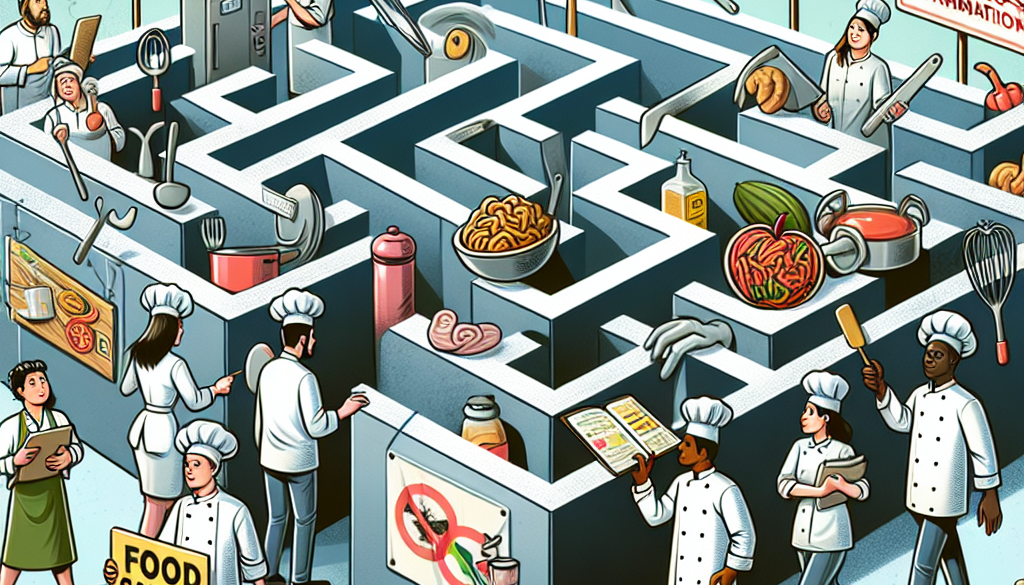Navigating Food Safety Challenges
-
Table of Contents
- Food Safety Challenges: Strategies for Safe Consumption
- Understanding Food Safety Risks
- Regulatory Frameworks and Standards
- Challenges in the Global Food Supply Chain
- Technological Advances in Food Safety
- Best Practices for Food Safety Management
- Consumer Education and Responsibility
- Conclusion: Key Takeaways for Ensuring Food Safety
- Enhance Your Diet with ETprotein’s High-Quality Protein Products
Food Safety Challenges: Strategies for Safe Consumption

Food safety is a critical issue that affects everyone. From farm to fork, ensuring the safety of our food involves navigating a complex web of challenges. With the global food supply chain becoming increasingly interconnected, the potential for foodborne illnesses and contamination has risen. This article explores the various food safety challenges and offers insights into how they can be effectively managed.
Understanding Food Safety Risks
Food safety risks can arise at any point in the supply chain. These risks are often categorized into three main types:
- Biological hazards: These include bacteria, viruses, parasites, and fungi that can cause foodborne illnesses.
- Chemical hazards: Pesticides, food additives, and contaminants like heavy metals fall into this category.
- Physical hazards: Foreign objects such as glass, metal, or plastic that can inadvertently end up in food products.
According to the World Health Organization (WHO), an estimated 600 million – almost 1 in 10 people in the world – fall ill after eating contaminated food, and 420,000 die every year. These statistics underscore the importance of robust food safety practices.
Regulatory Frameworks and Standards
Regulatory bodies around the world, such as the U.S. Food and Drug Administration (FDA) and the European Food Safety Authority (EFSA), have established standards and guidelines to ensure food safety. These regulations cover a wide range of areas, including:
- Maximum levels for food contaminants
- Safe handling and processing practices
- Labeling requirements
- Traceability of food products
Compliance with these regulations is essential for food producers and suppliers to maintain consumer trust and avoid costly recalls and legal issues.
Challenges in the Global Food Supply Chain
The globalization of the food supply chain presents unique challenges. Diverse food sources and longer transportation routes increase the risk of contamination and make traceability more difficult. Additionally, different countries have varying food safety standards, which can lead to inconsistencies in safety practices.
Technological Advances in Food Safety
Technology plays a pivotal role in enhancing food safety. Innovations such as blockchain for traceability, rapid testing methods for pathogens, and advanced packaging solutions help mitigate risks. For instance, blockchain technology can provide a transparent and immutable record of a product’s journey from farm to table, making it easier to pinpoint the source of contamination in the event of an outbreak.
Best Practices for Food Safety Management
Implementing best practices is crucial for navigating food safety challenges. Some of these practices include:
- Adhering to Good Agricultural Practices (GAP) and Good Manufacturing Practices (GMP)
- Regular training for employees on hygiene and safety protocols
- Implementing Hazard Analysis and Critical Control Points (HACCP) systems
- Conducting regular audits and inspections
- Ensuring proper storage and transportation conditions
By following these practices, food businesses can significantly reduce the risk of contamination and ensure the safety of their products.
Consumer Education and Responsibility
Consumers also play a vital role in food safety. Educating the public about proper food handling, storage, and preparation techniques can prevent many foodborne illnesses. For example, understanding the importance of cooking meat to the right temperature or washing fruits and vegetables before consumption are simple yet effective measures.
Conclusion: Key Takeaways for Ensuring Food Safety
Navigating food safety challenges requires a concerted effort from all stakeholders involved in the food supply chain. By understanding the risks, adhering to regulatory standards, leveraging technology, implementing best practices, and educating consumers, we can work towards a safer food system. It is a shared responsibility that, when taken seriously, can protect public health and maintain consumer confidence in the food industry.
Enhance Your Diet with ETprotein’s High-Quality Protein Products
If you’re looking to incorporate safe and high-quality protein into your diet, ETprotein offers a range of organic bulk vegan proteins that meet the highest standards of food safety. Their products, including Organic rice protein, pea protein, and various seed proteins, are non-GMO, allergen-free, and come with a guarantee of L-(+)-Ergothioneine purity over 98%.
ETprotein’s commitment to excellence makes them a trusted supplier for industries seeking reliable protein sources. Whether you’re in the food and beverage industry, sports nutrition, or health and wellness, ETprotein has the right protein solution for you.
About ETprotein:
ETprotein, a reputable protein and L-(+)-Ergothioneine (EGT) Chinese factory manufacturer and supplier, is renowned for producing, stocking, exporting, and delivering the highest quality organic bulk vegan proteins and L-(+)-Ergothioneine. They include Organic rice protein, clear rice protein, pea protein, clear pea protein, watermelon seed protein, pumpkin seed protein, sunflower seed protein, mung bean protein, peanut protein, and L-(+)-Ergothioneine EGT Pharmaceutical grade, L-(+)-Ergothioneine EGT food grade, L-(+)-Ergothioneine EGT cosmetic grade, L-(+)-Ergothioneine EGT reference grade and L-(+)-Ergothioneine EGT standard. Their offerings, characterized by a neutral taste, non-GMO, allergen-free attributes, with L-(+)-Ergothioneine purity over 98%, 99%, cater to a diverse range of industries. They serve nutraceutical, pharmaceutical, cosmeceutical, veterinary, as well as food and beverage finished product distributors, traders, and manufacturers across Europe, USA, Canada, Australia, Thailand, Japan, Korea, Brazil, and Chile, among others.
ETprotein specialization includes exporting and delivering tailor-made protein powder and finished nutritional supplements. Their extensive product range covers sectors like Food and Beverage, Sports Nutrition, Weight Management, Dietary Supplements, Health and Wellness Products, and Infant Formula, ensuring comprehensive solutions to meet all your protein needs.
As a trusted company by leading global food and beverage brands and Fortune 500 companies, ETprotein reinforces China’s reputation in the global arena. For more information or to sample their products, please contact them and email sales(at)ETprotein.com today.












